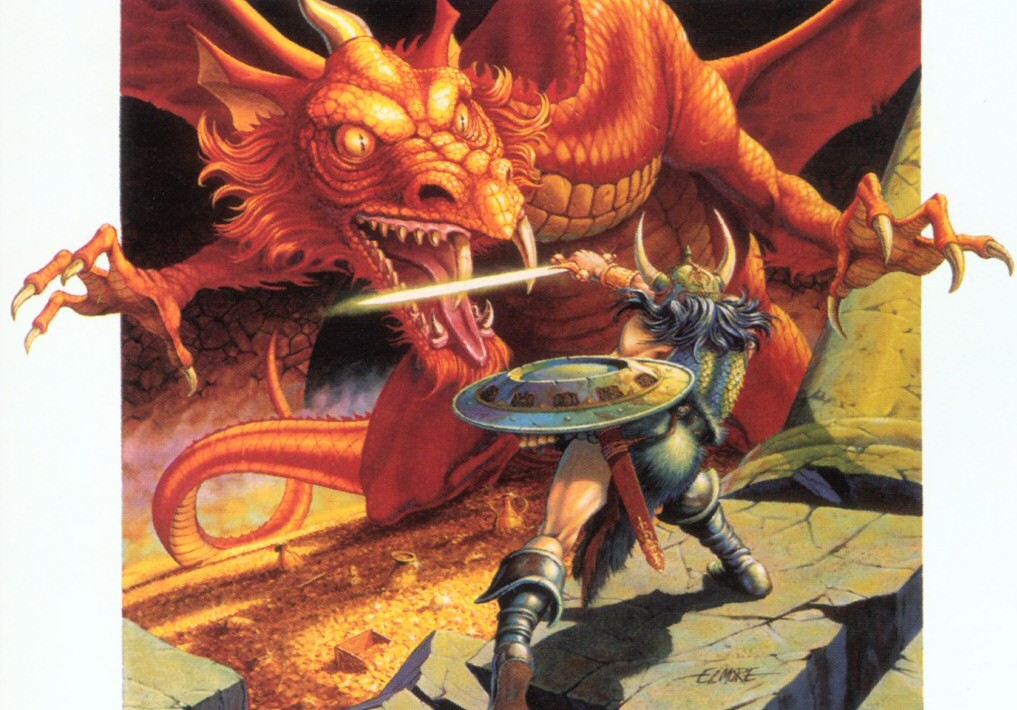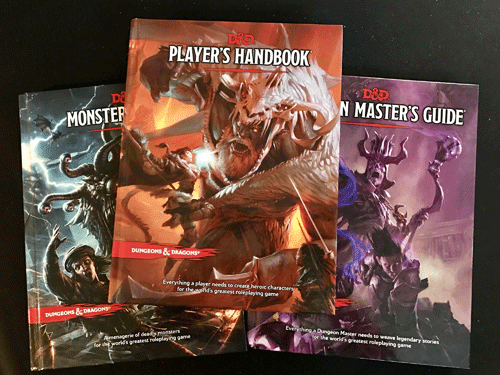The Ultimate Guide to Dungeons & Dragons: Part 2 - Why Play D&D? (And Not Something Else)
- Posted on
- By Tristan Donaldson
- Posted in D&D, Dungeons and Dragons
- 0

There is no better entry point to the world of TTRPGs than Dungeons and Dragons 5th Edition, here's why.
There’s no denying that D&D is a unique game, perhaps the first of its kind. However, why should you play a near fifty-year old game that only really uses dice, pencils, and paper?
D&D vs. Videogames
It’s easy to fall into the trap of believing that something more high tech is better than something that’s not. Videogames and TTRPGs are just different, and neither is inherently a better or worse gaming experience. That said, D&D has some strong advantages in certain areas:
A More Social Experience

Gaming online in multiplayer with friends is a lot of fun, don’t get me wrong, and gamers are actually more social than the stereotype allows. However, there is something that gets lost in the screen, something that only face-to-face interaction can convey. There’s nothing quite like being around a table with your closest friends, doing an activity, eating pizza, and laughing all the while. D&D is a social game. It requires teamwork and camaraderie if the party is going to succeed in their quest. Playing in person, you get to see everything play out in front of you-the collective shock, dread, surprise, elation, and victory as you experience every twist and turn of the story together. There’s a special, indescribable kind of energy in the room when you play, the kind you feel when you and your friends are watching a really good movie together, except you are the ones writing the movie this time.
Low Buy-In
All you need to start D&D are the books, dice, pencils, and paper. Even though the three core rulebooks, The Player's Handbook, Dungeon Master's Guide, and Monster Manual, run about $150 total, that’s still less expensive than a game console and individual games. Plus, after you buy those books, you pretty much have unlimited gaming options, whereas you can finish some videogames in a single afternoon.
Limitless Options
As just stated, D&D has unlimited options, because it relies on the imagination, which is already limitless. Videogames by comparison are inherently limited, because the programmers and designers can only code so much information into a single game. Eventually, you’ll just run out of digital content. Meanwhile, D&D can feasibly take place in any world, universe, or reality.
Plus, you can play the game anywhere! For videogames, you need a device. For D&D, you just need a flat surface to roll the dice. You can play it on a kitchen counter, at the dining room table, or huddled around a campfire, rolling the dice on a notebook. This is a game that you can play anywhere.
D&D vs. Other Table-Top RPGs
So, with all the options for TTRPGs out there, why choose D&D over all the others?
Epic Fantasy…or Anything Else You Want
D&D is the premiere heroic adventure game. Sure, plenty of swords and sorcery TTRPGs exist, but they owe a lot to D&D as an inspiration. The concept of playing an individual hero in a party who saves the day and gains levels of experience really came from D&D. It was the game that united ancient myth, fantasy literature, and classic fairy tales under one banner and in a single world.

Never before had that been done, and it’s still common practice today.
This unified world means infinite options for storytelling and gaming. Where some RPGs have a definitive setting, and D&D has a few itself, anything can realistically happen in this world. The rulebooks are just a guide for crafting your own setting.
You can have as much or as little as you want of combat, roleplay, or storytelling. You can craft games based on action, horror, romance, or any other genre. You can dungeon crawl in another dimension or be professional vampire hunters. There are creatures and settings that can fit every flavor of game, whatever the DM and the players want.
Popularity
By popularity, I don’t mean jumping on a D&D bandwagon, but rather that popularity translates to accessibility. 5th Edition is the most popular TTRPG today, and maybe of all time. That means you will have no shortage of players or DMs looking for groups, tutorials, live plays, podcasts, or community if you play 5E. Often local game shops (come into one of our three Fair Game locations to learn more!) will host campaigns or you can find campaigns to join online. No matter where you go, you’re likely to find somebody who plays.
There are also plenty of official materials designed for absolute beginner DMs and players, such as the Starter Set, which contains dice and an adventure.
Getting started is always the hardest part of anything, but having access to all of these resources makes it easier to become part of the community and learn the game.
Simplicity
5th Edition is probably the most streamlined version of the game, because the designers deliberately wanted to introduce new people to it. That principal makes it more forgiving than other RPG systems, which can feel daunting to start with giant rulebooks and tons of numbers.
5E is based primarily around a twenty-sided die. You roll it for pretty much every check in the game, making it simpler for the player. Your characters also start their 1st Level with maximum hit points and a decent amount of abilities, meaning that they’re fairly beefy to start and new players shouldn’t worry about dying immediately if they make mistakes. 5E also makes resting and healing easy, with a few options right off the bat.
The Perfect Introduction

Eventually, you may find that your tastes change. You may get bored of D&D’s classic high fantasy, and try something else. But to start? There is no better entry point to the world of TTRPGs for the reasons listed. D&D was the inspiration for all other modern RPGs, and is worth playing for that alone. However, from a practical standpoint, D&D gives you some reference for what other RPGs will be like, and makes it simple to learn.
Keep going! Read Part 3 - How to Get Started as a Dungeon Master in D&D


You mentioned the low buy-in cost, but it's even better than that. Only the DM needs to have the full $150 buy-in and players can start with just the $50 Player's Handbook. Or, the group can try the Starter Set for under $25. (Of course, players will all want to buy all three in order to support Fair Game.) ;-)